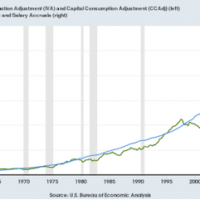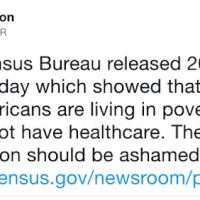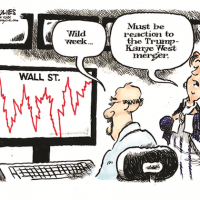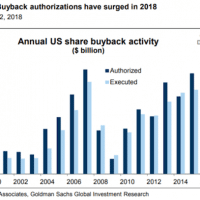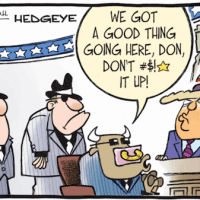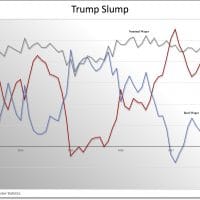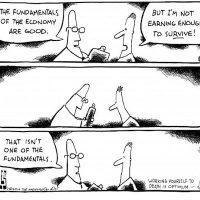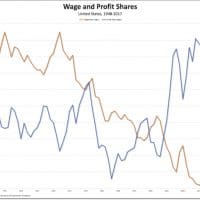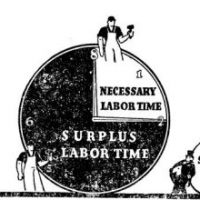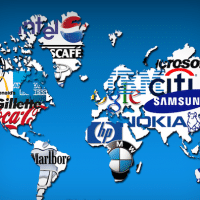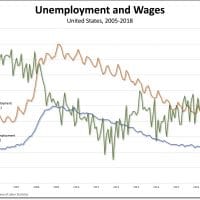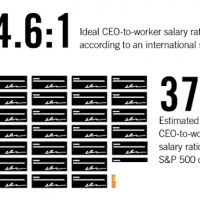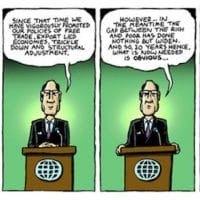-
Left behind
The historically low black unemployment rate is one of Donald Trump’s favorite applause lines. Even Reuters [ht: ja] declares that Trump is right.
-
Never have corporate profits outgrown employee compensation so clearly and for so long
Those aren’t my words. The quotation that forms the title of this post is from a recent Federal Reserve Bank of St. Louis blog post.
-
Sciences of inequality
Last month, Philip Alston, the United Nations Special Rapporteur on extreme poverty and human rights (whose important work I have written about before), issued a tweet about the new poverty and healthcare numbers in the United States along with a challenge to the administration of Donald Trump (which in June decided to voluntarily remove itself from membership in the United Nations Human Rights Council after Alston issued a report on his 2017 mission to the United States).
-
Goosing the corporate goose
No, the stock market is not predictable. And no one knows the exact causes of last week’s carnage on Wall Street—with the Dow down 4.2 percent, the S&P 4.1 percent and the Nasdaq 3.7 percent, representing their worst weekly performances since March.
-
Sympathy for the devil?
In recent years, as so often in the past, we’ve witnessed those at the top sabotaging the pact (simply because they have the means and interest to do so) and now, once again, they’ve undermined their legitimacy to run things.
-
Economic moats and American capitalism
In a 1999 interview with Fortune, legendary investor Warren Buffett coined the term “economic moats” to sum up the main pillar of his investing strategy.
-
Utopia and materialist critique
The argument I’ve been making during this series on utopia is that the utopian moment of the Marxian alternative to mainstream economics is critique.*
-
Don’t class warfare me
Marketplace’s Kai Ryssdal is no class warrior.
-
Disappearing poverty
In international human rights law, a “forced disappearance” occurs when a person is secretly abducted or imprisoned by a state or political organization (or by a third party with the authorization, support, or acquiescence of a state or political organization), followed by a refusal to acknowledge the person’s fate and whereabouts, with the intent of placing the victim outside the protection of the law.
-
I ran out of words to describe how bad the recovery numbers are
Back in June, Neil Irwin wrote that he couldn’t find enough synonyms for “good” to adequately describe the jobs numbers.
-
Worker rights in the United States
Ambassador Nikki Haley’s decision last week to withdraw the United States from the United Nations Human Rights Council is remarkable. The United States is the first nation in the body’s 12-year history to voluntarily remove itself from membership in the council while serving as a member.
-
Class struggle according to liberals
Liberals like to talk about all kinds of social ills and identity-laden tensions—but not class struggle. That’s their persistent and enduring blindspot.
-
Utopia and technology
Forget Bitcoin. It’s the underlying technology, blockchain, that is generating the most excitement. Even utopia!
-
Marx ratio
First there was the Great Gatsby curve. Then there was the Proust index. Now, thanks to Neil Irwin, we have the Marx ratio.
-
Utopia and value theory
Mainstream economists refer to it as price theory, everyone else value theory. But whatever it’s called, it’s at the center of economists’ differing explanations of what happens in (and alongside) markets.
-
Their beautiful recovery
Does anyone really need any additional evidence of the lopsided nature of the current recovery?
-
Inequality and fairness
In a 2014 study, Sorapop Kiatpongsan and Michael Norton asked about 55,000 people around the globe, including 1,581 participants in the United States, how much money they thought corporate CEOs made compared with unskilled factory workers.
-
World employers report
The history of capitalism is actually a combination of two histories: it’s a history of employers attempting to hire workers and develop new technologies to make profits and expand the reach of capitalism; it’s also a history of workers banding together to improve wages and working conditions and imagine ways of moving beyond capitalism.
-
Debt and taxes
Tax cuts and spending increases enacted by Republicans over the past four months will lead to wider than previously expected budget deficits, according to the Congressional Budget Office. The federal budget deficit would total $804 billion this year, 43 percent higher than it had projected last summer, and exceed $1 trillion a year starting in 2020.
-
Ten years after crash
The economic crises that came to a head in 2008 and the massive response—by the U.S. government and corporations themselves—reshaped the world we live in.* Although sectors of the U.S. economy are still in one of their longest expansions, most people recognize that the recovery has been profoundly uneven and the economic gains have not been fairly distributed.


